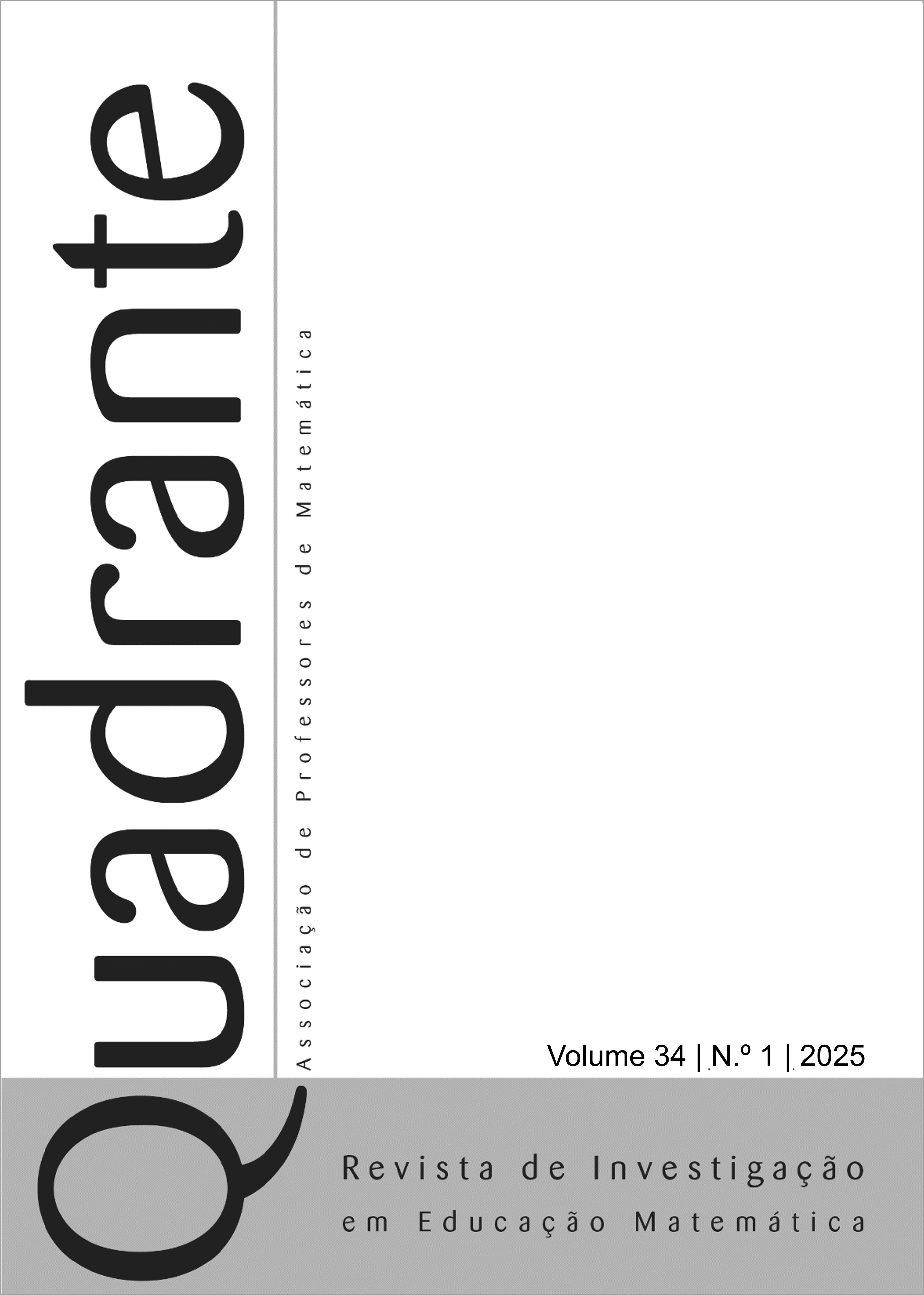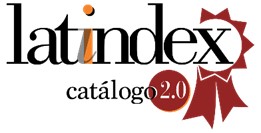Modelação de fenómenos sociais: uma ponte entre a realidade e a aprendizagem de funções
DOI:
https://doi.org/10.48489/quadrante.41279Palavras-chave:
alunos de 8º ano, aprendizagem da matemática, funções, justiça social, modelação matemáticaResumo
Fortalecer, nos alunos, a compreensão conceptual e de procedimentos matemáticos, o pensamento crítico, a literacia matemática, e desenvolver aptidões para a interpretação da realidade social – e, com isso, criar possibilidades para que desconstruam as relações de poder e as desigualdades de recursos e de oportunidades – é o repto central da educação matemática para a justiça social. Com base neste princípio orientador, este estudo visa caraterizar as atividades de alunos na resolução de tarefas de modelação, com foco na justiça social, no âmbito da aprendizagem de funções. Na concretização deste objetivo, adotou-se uma metodologia qualitativa e interpretativa, com um design de estudo de caso relativo a uma turma de 8º ano. Os dados foram recolhidos através da observação não participante e da gravação vídeo de aulas, da resolução dos alunos às tarefas propostas e de notas de campo. Os resultados mostram que os alunos percorreram as etapas do processo de modelação, com autonomia variável consoante as dificuldades, envolvendo-se em atividades como a leitura crítica de dados e discussões reflexivas. A resolução das tarefas e a sua discussão promoveu a mobilização do conhecimento reflexivo e de experiências socioculturais, favorecendo o desenvolvimento da consciência sociopolítica.
Referências
Alrø, H., & Skovsmose, O. (2021). Diálogo e aprendizagem em educação matemática. Autêntica.
Amado, J. (Coord.) (2017). Manual de Investigação Qualitativa em Educação (2ª Ed.). Imprensa da Universidade de Coimbra.
Araújo, J. L. (2009). Uma abordagem sócio-crítica da modelagem matemática: a perspectiva da educação matemática crítica. Alexandria: Revista de Educação em Ciência e Tecnologia, 2(2), 55–68. https://periodicos.ufsc.br/index.php/alexandria/article/view/37948/28976
Asempapa, R. S. (2015). Mathematical modeling: Essential for elementary and middle school students. Journal of Mathematics Education, 8(1), 16–29. https://journalofmathed.scholasticahq.com/article/90005
Asempapa, R. S. (2018). Assessing teachers’ knowledge of mathematical modeling: Results from an initial scale development. Journal of Mathematics Education, 11(1), 1–16. https://doi.org/10.26711/007577152790017
Barbosa, J. C. (2006). Mathematical modelling in classroom: A socio-critical and discursive perspective. ZDM–Mathematics Education, 38, 293–301. https://doi.org/10.1007/BF02652812
Bardin, L. (2016). Análise de conteúdo. Edições 70.
Belavi, G., & Murillo, F. J. (2020). Democracia y justicia social en las escuelas: Dimensiones para pensar y mejorar la práctica educativa. REICE. Revista Iberoamericana Sobre Calidad, Eficacia y Cambio en Educación, 18(3), 5–28. https://doi.org/10.15366/reice2020.18.3.001
Blomhøj, M., & Jensen, T. H. (2003). Developing mathematical modelling competence: Conceptual clarification and educational planning. Teaching Mathematics and its Applications, 22(3), 123–139. https://doi.org/10.1093/teamat/22.3.123
Blum, W. (2015). Quality teaching of mathematical modelling: What do we know, what can we do? In S. Cho (Ed.), The Proceedings of the 12th International Congress on Mathematical Education. Springer. https://doi.org/10.1007/978-3-319-12688-3_9
Blum, W., & Borromeo Ferri, R. (2009). Mathematical modelling: Can it be taught and learnt? Journal of Mathematical Modelling and Application, 1(1), 45–58.
Blum, W., & Leiβ, D. (2007). How do students and teachers deal with mathematical modelling problems? The example sugarloaf and the DISUM project. In C. Haines, P. L. Galbraith, W. Blum, & S. Khan (Eds.), Mathematical modelling (ICTMA 12): Education, engineering and economics (pp. 222–231). Ellis Horwood.
Blum, W., & Niss, M. (2024). Origin and development of the notion of mathematical modelling competency/competencies. In H.-S. Siller, V. Geiger, & G. Kaiser (Eds.), Researching mathematical modelling education in disruptive times. International Perspectives on the teaching and learning of mathematical modelling (pp. 185–200). Springer. https://doi.org/10.1007/978-3-031-53322-8_14
Bogdan, R., & Biklen, S. (2013). Investigação qualitativa em educação – Uma introdução à teoria e aos métodos (1ª Ed., 6ª reimp.). Porto Editora.
Borromeo Ferri, R. (2006). Theoretical and empirical differentiations of phases in the modelling process. ZDM–Mathematics Education, 38, 86–95. https://doi.org/10.1007/BF02655883
Brandt, C. F., Burak, D., & Kluber, T. E. (Orgs.) (2016). Modelagem matemática: perspectivas, experiências, reflexões e teorizações. Editora UEPG.
Carreira, S., & Blum, W. (2021). Modelação matemática no ensino e aprendizagem da matemática: Parte 1. Quadrante, 30(1), 1–7. https://doi.org/10.48489/quadrante.24926
Cohen, L., Manion, L., & Morrison, K. (2018). Research Methods in Education. Routledge. https://doi.org/10.4324/9781315456539
D'Ambrosio, U. (2009). Mathematical modeling: Cognitive, pedagogical, historical and political dimensions. Journal of Mathematical Modelling and Application, 1(1), 89–98.
Dean, J. (2013). Living Algebra, living wage. In E. Gutstein, & B. Peterson (Eds.), Rethinking Mathematics: Teaching Social Justice by the Numbers (pp. 67–68). Rethinking Schools.
Denzin, N. K., & Lincoln, Y. S. (Eds.) (2018). The Handbook of Qualitative Research. Sage.
English, L. D., & Watters, J. J. (2005). Mathematical modelling in the early school years. Mathematics Education Research Journal, 16, 58–79. https://doi.org/10.1007/BF03217401
Erickson, F. (1986). Qualitative Methods in Research on Teaching. In M. Wittrockk (Ed.), Handbook of Research on Teaching (3rd ed.), (pp. 119–161). McMillan.
Frankenstein, M. (2012). Quantitative form in arguments. In S. Mukhopadhyay, & W. M. Roth (Eds.), Alternative forms of knowing (in) mathematics. Celebrations of diversity of mathematical practices (pp. 23 - 297). Sense Publishers. https://doi.org/10.1007/978-94-6091-921-3_14
Fraser, N. (2022). Justiça interrompida: Reflexões críticas sobre a condição "pós-socialista". Boitempo Editorial.
Galbraith, P. (2024). Modelling, teaching, and reflecting: What more I have learned? In H.-S. Siller, V. Geiger, & G. Kaiser (Eds.), Researching Mathematical Modelling Education in Disruptive Times. International Perspectives on the Teaching and Learning of Mathematical Modelling. Springer. https://doi.org/10.1007/978-3-031-53322-8_10
Galbraith, P., & Stillman, G. (2006). A framework for identifying student blockages during transitions in the modelling process. ZDM–Mathematics Education, 38, 143–162 https://doi.org/10.1007/BF02655886
Geiger, V., Galbraith, P., Niss, M., Delzoppo, C. (2022). Developing a task design and implementation framework for fostering mathematical modelling competencies. Educational Studies in Mathematics, 109, 313–336. https://doi.org/10.1007/s10649-021-10039-y
Gildehaus, L., & Liebendörfer, M. (2021). CiviMatics: Mathematical modelling meets civic education. Exploring New Ways to Connect: Proceedings of the Eleventh International Mathematics Education and Society Conference (Vol. 1, 167–171). https://doi.org/10.5281/zenodo.5391966
Greer, B., & Verschaffel, L. (2007). Modelling competencies — Overview. In W. Blum, P. Galbraith, H. W. Henn, & M. Niss (Eds.), Modelling and Applications in Mathematics Education (pp. 219–224). Springer. https://doi.org/10.1007/978-0-387-29822-1_22
Greefrath, G., & Carreira, S. (2024). Mathematical applications and modelling in mathematics education. In J. Wang (Ed.), Proceedings of the 14th International Congress on Mathematical Education (Vol.1, pp. 417–421). ICMI. https://doi.org/10.1142/9789811287152_0046
Gutiérrez, R. (2012). Context matters: How should we conceptualize equity in mathematics education? In B. Herbel-Eisenmann, J. Choppin, D. Wagner, & D. Pimm (Eds.), Equity in Discourse for Mathematics Education. Mathematics Education Library (pp. 17–33). Springer. https://doi.org/10.1007/978-94-007-2813-4_2
Gutiérrez, R. (2018). Why we need to rehumanize mathematics. In Annual Perspectives in Mathematics Education: Rehumanizing mathematics for students who are Black, Latinx, and Indigenous (pp. 1–10). National Council of Teachers of Mathematics.
Gutiérrez, R., Kokka, K., & Myers, M. (2024). Political conocimiento in teaching mathematics: Mathematics teacher candidates enacting their ethical identities. Journal of Mathematics Teacher Education, 27, 755–781. https://doi.org/10.1007/s10857-024-09627-5
Gutstein, E. (2003). Teaching and learning mathematics for social justice in an urban, latino school. Journal for Research in Mathematics Education, 34(1), 37–73. https://doi.org/10.2307/30034699
Gutstein, E. (2018). The struggle is pedagogical: Learning to teach critical mathematics. In P. Ernest (Ed.), The Philosophy of Mathematics Education Today. ICME-13 Monographs (pp. 131–143) Springer. https://doi.org/10.1007/978-3-319-77760-3_8
Gutstein, E., & Peterson, B. (Eds.) (2013). Rethinking mathematics: Teaching social justice by the numbers (2.ª edição). Rethinking Schools.
Jurdak, M. (2016). Real-world problem solving from the perspective of critical mathematics education. In M. Jurdak (Ed.), Learning and teaching real world problem solving in school mathematics (pp 109–120). Springer. https://doi.org/10.1007/978-3-319-08204-2_7
Kaiser, G., & Brand, S. (2015). Modelling competencies: Past development and further perspectives. In G.A. Stillman, W. Blum, & M. S. Biembengut (Eds.), Mathematical modelling in education research and practice: Cultural, social and cognitive influences (pp. 129–149). Springer International Publishing.
Kaiser, G., & Schwarz, B. (2006). Mathematical modelling as bridge between school and university. ZDM–Mathematics Education, 38, 196–208. https://doi.org/10.1007/BF02655889
Lesh, R., & Heger, M. (2001). Mathematical abilities that are most needed for success beyond school in a technology-based age of information. The New Zealand Mathematics Magazine, 38, 1–17.
McMillan, J., & Schumacher, S. (2014). Research in education evidence-based inquiry. Pearson.
Miles, M. B., Huberman, A. M., & Saldaña, J. (2020). Qualitative data analysis: A methods sourcebook. Sage.
MEC - Ministério da Educação e Ciência (2021). Aprendizagens Essenciais da Matemática para o Ensino Básico. MEC–DGE.
Moses, R., & Cobb, C. (2001). Radical equations: Math literacy and civil rights. Beacon Press.
NCTM (2007). Princípios e Normas para a Matemática Escolar. Associação de Professores de Matemática.
Powell, A. B. (2022). Decolonizing mathematics instruction: Subordinating teaching to learning. Bolema, 36(73), 1–10. https://doi.org/10.1590/1980-4415v36n73e01
Rawls, J. (2013). Uma teoria da justiça (3.ª edição). Editorial Presença.
Rosa, M., & Orey, D. C. (2015). Social-critical Dimension of Mathematical Modelling. In G. Stillman, W. Blum, & M. S. Biembengut (Eds), Mathematical Modelling in Education Research and Practice. International Perspectives on the Teaching and Learning of Mathematical Modelling (pp. 385–395). Springer. https://doi.org/10.1007/978-3-319-18272-8_32
Rubel, L. H., & Nicol, C. (2020). The power of place: spatializing critical mathematics education. Mathematical Thinking and Learning, 22(3), 173–194. https://doi.org/10.1080/10986065.2020.1709938
Rubel, L. H., Nicol, C., & Chronaki, A. (2021). A critical mathematics perspective on reading data visualizations: Reimagining through reformatting, reframing, and renarrating. Educational Studies Mathematics, 108, 249–268. https://doi.org/10.1007/s10649-021-10087-4
Schukajlow, S., & Blum, W. (2023). Methods for teaching modelling problems. In G. Greefrath, S. Carreira, & G. Stillman (Eds.), Advancing and Consolidating Mathematical Modelling. International Perspectives on the Teaching and Learning of Mathematical Modelling (pp 327–339). Springer. https://doi.org/10.1007/978-3-031-27115-1_20
Siller, H.-S., Geiger, V., & Kaiser, G. (2024). Researching mathematical modelling education in disruptive times—An introduction. In H. S. Siller, V. Geiger, & G. Kaiser (Eds.), Researching Mathematical Modelling Education in Disruptive Times. International Perspectives on the Teaching and Learning of Mathematical Modelling (pp 3–11). Springer. https://doi.org/10.1007/978-3-031-53322-8_1
Simic-Muller, K. (2019). “There Are Different Ways You Can Be Good at Math”: Quantitative Literacy, Mathematical Modeling, and Reading the World. PRIMUS, 29(3–4), 259–280. https://doi.org/10.1080/10511970.2018.1530705
Skovsmose, O. (2007). Educação crítica: Incerteza, matemática, responsabilidade. Cortez.
Skovsmose, O. (2021). Mathematics and crises. Educational Studies in Mathematics, 108(1), 369–383. https://doi.org/10.1007/s10649-021-10037-0
Skovsmose, O. (2023). Critical Mathematics Education. Springer.
Skovsmose, O., & Valero, P. (2002). Quebrando a neutralidade política: o compromisso crítico entre a educação matemática e a democracia. Quadrante, 11(1), 7–28. https://doi.org/10.48489/quadrante.22748
Stillman, G. (2019). State of the art on modelling in mathematics education—Lines of inquiry. In G. Stillman, & J. Brown (Eds.), Lines of Inquiry in Mathematical Modelling Research in Education (ICME-13 Monographs) (pp. 1-20). Springer. https://doi.org/10.1007/978-3-030-14931-4_1
Verschaffel, L., Greer, B., & De Corte, E. (2002). Everyday knowledge and mathematical modeling of school word problems. In K. P. E. Gravemeijer, R. Lehrer, B. van Oers, & L. Verschaffel (Eds.), Symbolizing, modeling and tool use in mathematics education (pp. 257–276). Springer. https://doi.org/10.1007/978-94-017-3194-2_16
Villa-Ochoa, J. A. (2015). Modelación matemática a partir de problemas de enunciados verbales: un estudio de caso con profesores de matemáticas. Magis. Revista Internacional de Investigación en Educación, 8(16), 133–148. https://doi.org/10.11144/Javeriana.m8-16.mmpe
Villa-Ochoa, J. A., Castrillón-Yepes, A., & Sánchez-Cardona, J. (2017). Tipos de tareas de modelación para la clase de matematica. Espaço Plural, 18(36), 219–251. https://e-revista.unioeste.br/index.php/espacoplural/article/view/19718
Viseu, F., & Menezes, L. (2014). Desenvolvimento do conhecimento didático de uma futura professora de matemática do 3.º ciclo: O confronto com a sala de aula na preparação e análise de tarefas de modelação matemática. Revista Latinoamericana de Investigación en Matemática Educativa, 17(3), 347–374. https://doi.org/10.12802/relime.13.1734
Vithal, R., Brodie, K., & Subbaye, R. (2024). Equity in mathematics education. ZDM-Mathematics Education, 56, 153–164. https://doi.org/10.1007/s11858-023-01504-4
Wright, P. (2016). Social justice in the mathematics classroom. London Review of Education 14(2), 104–118. https://doi.org/10.18546/LRE.14.2.07
Yin, R. K. (2017). Case study research – Design and methods (6th Edition). Sage.
Young, I. M. (2022). Justice and the politics of difference. Princeton University Press.











